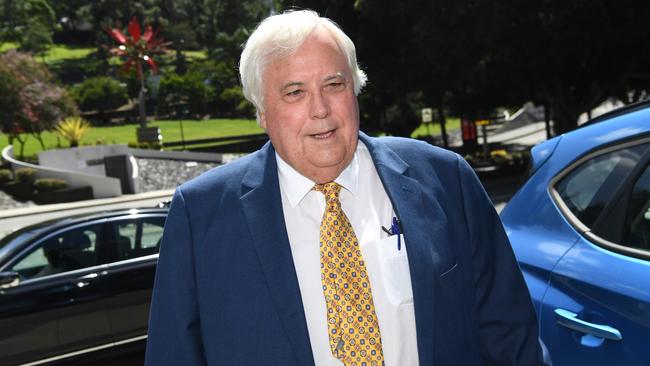CITIC’s $16bn iron ore mine could slow production after legal loss to Clive Palmer
China’s CITIC is considering plans to significantly cut production at its massive Sino Iron magnetite operation in the Pilbara in the face of a long-running legal dispute with Clive Palmer.

China’s CITIC is considering plans to significantly cut production at its massive Sino Iron magnetite operation in the Pilbara in the face of a long-running legal dispute with Clive Palmer that threatens to cut short the $16bn project’s life.
The Australian understands CITIC is considering production cuts of a quarter to a third of the 22 million tonne a year operation as it looks for a way around an impasse over the expansion of tailings and waste rock storage.
Sino Iron produces a high-grade concentrate that sells at a premium to traditional Pilbara direct shipping ore, and now delivers a handsome profit to its Chinese owners and about $500m in royalties a year to Mr Palmer.
But the project came in billions over budget and years later than expected. It only became profitable in 2019 amid high iron ore prices caused by the curtailment of Brazilian iron ore mines.
The project is now a valuable contributor to CITIC’s global operations, booking a $US475m net profit in 2022, and $US948m the previous year as iron ore prices peaked.
But that is now under threat as another of CITIC’s sprawling legal disputes with the Queensland businessman spills over – along with the valuable royalty stream delivered to the West Australian government and Clive Palmer.
CITIC booked $US2.54bn in revenue from sales of Sino Iron concentrate in 2022, according to its annual financial accounts.
Magnetite concentrate production carries a 5 per cent royalty rate on the price of ore at the port, and CITIC pays a separate royalty of up to $US10 a tonne to Clive Palmer’s company, Mineralogy.
Cutting even a quarter of the mine’s output could cost Mr Palmer $US55m in annual royalty payments, depending on iron ore prices.
CITIC could be forced to shed jobs as a result of the decision, although industry sources say CITIC is keen to avoid losing staff with experience in magnetite operations, given a raft of rivals – including Fortescue Metals Group, Gina Rinehart’s Hancock Prospecting and Mineral Resources – are also moving into the magnetite sector.

The Australian understands CITIC is considering cutting production as it runs out of room in the project’s tailings dam and waste rock storage areas needed to keep operating the mine – which takes ore grading only about 30 per cent iron and processes it to concentrate with a target grade of about 67 per cent.
CITIC lost a fight in the WA Supreme Court in March aimed at forcing Mineralogy to make available additional tenements needed to expand the project’s tailings dam and waste rock disposal facilities – collectively referred to as mine continuation proposals (MCPs) in the legal disputes.
In his March decision, Justice Kenneth Martin said the “mutually hostile” relations between the companies risked killing of a project that had “laid golden eggs for many”.
“A ‘fog of war’ that has prevailed for too long between the Sino Iron project parties has seen them all behave towards each other in surprisingly uncommercial ways over time,” he said.
CITIC has said in legal filings it needs to find additional space for waste ore and tailings before the middle of 2025, with the company believed to be considering slowing output to buy itself more time to find an alternative solution to its current plans, given it would take years to build new waste facilities if land became available.
Most other WA mining companies would be able to simply peg or purchase additional land near their processing plant to resolve a similar situation, but the Chinese corporate giant sits in a unique position stemming from the original 2006 deal between CITIC and Mineralogy.
CITIC did not buy mining tenements from Mr Palmer at the time, only the right to mine tenements held by Mineralogy under its own State Agreement with the WA government.
That deal has effectively left Mineralogy in control of CITIC’s ultimate destiny, in that it is Mineralogy – as the owner of the underlying mining tenements – that submits environmental and other approvals to regulators to allow the expansion or extension of CITIC’s mining activities.
Relations between the two companies turned hostile when CITIC baulked at the original contract’s royalty rates as iron ore prices fell and the costs of building the project rose, and the Chinese state-owned giant has repeatedly accused Mineralogy of delaying submitting approval documents as leverage in other legal disputes between the two companies.
CITIC initially sought access to new Mineralogy tenements for a tailings dam and waste rock storage in 2016. Court documents show that in 2019 Mr Palmer demanded the company pay a $US750m access fee to grant the company use of the additional tenements.
In his March decision, Justice Martin rejected CITIC’s application to force Mineralogy to make the additional land available, describing the company’s initial plans as “extravagant”. Justice Martin also dismissed CITIC claims that Mineralogy had engaged in unconscionable conduct by refusing to assist with the mine’s continuation plans as presented by CITIC.
But he did issue orders forcing Mineralogy to progress approvals for geotechnical work aimed at examining the feasibility of new storage facilities on ground that CITIC already has the right to use under the Mineralogy agreements.
CITIC’s board is due to meet on August 31 to consider the company’s half-year financial accounts, and a decision on Sino Iron’s future output could be made at that time.




To join the conversation, please log in. Don't have an account? Register
Join the conversation, you are commenting as Logout